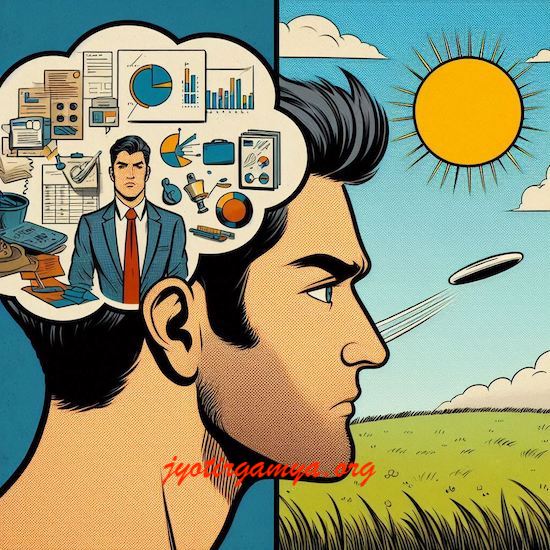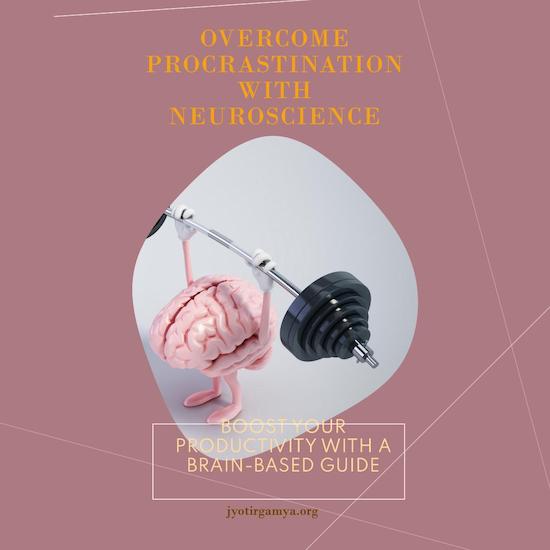Overcoming Procrastination with Neuroscience
Story: The Allure of Frisbee
David stared at his computer screen. It was as blank as his mind! Sunshine peeked through the window, and David could almost feel the warmth on his skin. Perfect frisbee weather! But a big red circle loomed on the calendar – “Review!” David squeezed his eyes shut, trying to focus on work. Numbers and reports danced in his head, but they couldn’t compete with the image of a frisbee soaring through the bright blue sky.

Hours later, David’s desk resembled a war zone. Papers were scattered like fallen soldiers, empty coffee cups stood at attention, and David looked like he’d been through the trenches. He even had a crazy Hawaiian shirt on, contrasting his tired eyes.
Stuck to his ukulele, his usual happy companion was a small, crumpled piece of paper. It was supposed to be a to-do list, but the only thing legible was “TPS Report,” crossed out several times with frantic scribbles.

David slumped in his chair, letting out a long groan. “Looks like another all-nighter,” he mumbled, his voice thick with exhaustion. But as he reached for another cup of coffee, a tiny spark flickered in his eye. Maybe, just maybe, tomorrow, he’d start on that report before the sun started calling his name.
A small smile played on his lips. Maybe tomorrow!
Understanding Procrastination: Why We Do It and How to Stop
We’ve all been there. That looming deadline, the unfinished project, the voice in our head whispering, “I’ll do it later.” Despite knowing the downsides, this act of putting things off is called procrastination.
Procrastination is voluntarily delaying or postponing a task, even when we know it might cause problems later. Research suggests that around 20% of adults are chronic procrastinators, putting things off more than the occasional time.
Procrastination isn’t just about feeling disorganized. It can significantly impact our productivity and mental wellbeing. When we procrastinate, we risk missing deadlines, rushing through tasks, and ultimately delivering lower-quality work. This can lead to frustration, disappointment, and even career setbacks.
The emotional toll is just as significant. Procrastination often creates a cycle of stress, anxiety, and guilt. We worry about the unfinished task, which adds to our stress levels. The anxiety can then make it even harder to focus and get started, creating a vicious cycle.
But there’s hope! By understanding the science behind procrastination, we can develop strategies to overcome it. Neuroscience can illuminate why our brains might be wired to put things off and how we can retrain our thinking patterns for greater productivity and peace of mind.

The Battle Within Your Brain on Procrastination
Ever feel stuck staring at your phone when you should be working on that looming project? This battle between wanting to relax now and getting things done has a scientific explanation. Let’s explore the two brain regions involved in procrastination!
Neurobiology of Procrastination
Imagine two critical players in your brain
-
Limbic System (Reward Center): Remember that happy feeling you get from checking social media? That’s your limbic system at work! It craves instant gratification and releases dopamine, a “feel good” chemical when you do things you enjoy.
-
Prefrontal Cortex (Planning Center): Think of your prefrontal cortex as the adult in the room. It’s responsible for planning, focusing on long-term goals, and making decisions.
These two regions can clash, leading to procrastination.
The Tug-of-War
Imagine you have a big presentation due. Your limbic system might nudge you to search social media for a quick dopamine boost. It feels good, but it pushes the project further down the line. Your prefrontal cortex, on the other hand, knows you should be working. But if you’re stressed or haven’t slept well, this planning center might feel sluggish, making it harder to resist the limbic system’s “fun now” signals.
The good news? We can strengthen our prefrontal cortex, making it the ultimate winner!
-
Exercise: Just like any muscle, the prefrontal cortex gets stronger with use. Exercise is a fantastic way to boost blood flow to this area, improving its function. A brisk walk, a bike ride, or even jumping jacks can help you focus better and resist procrastination.
-
Meditation: Think of meditation as brain training for your prefrontal cortex. By focusing on your breath and quieting the mind, you can strengthen your ability to regulate emotions and resist impulsive behaviors like procrastination. Even a few minutes of meditation each day can make a big difference.
-
Sleep: When well-rested, your prefrontal cortex is firing on all cylinders. Adequate sleep helps you concentrate, make better decisions, and resist distractions. Aim for 7-8 hours of sleep each night to keep your brain sharp and ready to tackle any task.
By understanding these brain regions and how to strengthen the prefrontal cortex, we can start to tip the scales in favor of getting things done!
The Price We Pay: Procrastination’s Impact
We all know the feeling – that looming project, the unreturned email, the voice whispering, “I’ll do it later.” But this might-be-fun-later approach can have a significant downside. Let’s explore how procrastination can impact our mental health and productivity.
Psychological Effects of Procrastination
Procrastination isn’t just about feeling disorganized. It can take a real toll on our emotions.
-
Stress and Anxiety: The closer a deadline gets, the more stressed and anxious we feel. We worry about meeting expectations, doubt our abilities and the pressure builds. This can make it even harder to focus and get started.
-
Guilt and Shame: When we miss deadlines or let others down, guilt and shame can creep in. These negative emotions can further chip away at our motivation and self-esteem.
-
Mental Health Link: Research suggests a potential link between chronic procrastination and mental health issues like depression. The constant stress and negative self-talk can significantly affect our overall well-being.
Productivity Consequences
Procrastination doesn’t just hurt our feelings; it hurts our work too.
-
Missed Deadlines and Lost Opportunities: When we put things off, deadlines get missed, and opportunities can slip away. This can negatively impact our work performance and reputation.
-
Reduced Quality of Work: Completing tasks at the last minute often leads to sloppy work and errors. This can lead to frustration for ourselves and others.
Outsmarting Your Brain: Neuroscience-Based Strategies
We’ve learned why procrastination can be a drag, but there’s hope! Neuroscience offers some excellent tools to outsmart your brain and get things done. Here are some strategies based on how your brain works:
Behavioral Interventions
Remember dopamine, the “feel good” brain chemical? Completing small tasks triggers dopamine release, giving you a mini-reward and a sense of accomplishment. This motivates you to keep going, one small win at a time. Break down large projects into bite-sized chunks and celebrate each completed step!
The prefrontal cortex, your brain’s planning center, thrives on organization. Here’s how to give it a boost.
-
SMART Goals: Set clear, specific goals (like “write 500 words today”) instead of vague ones (“work on the report”).
-
Prioritize: Not all tasks are created equal. Figure out what’s most essential and tackle those first.
-
Schedule It In: Block out dedicated time in your calendar for specific tasks. Be realistic about how much time each step will take.
Distraction Busters: Your prefrontal cortex needs focus to function at its best. Here are some ways to minimize distractions:
-
Timeboxing: Work in focused bursts with short breaks in between. Set a timer for 25 minutes, work intensely, then reward yourself with a short break.
-
Silence the Sirens: Turn off notifications, silence your phone, and find a quiet workspace to minimize interruptions.
Cognitive Techniques
Our thoughts can be powerful allies or sneaky saboteurs. Here’s how to use them to your advantage:
-
Cognitive Restructuring: When you think negative thoughts about a task (“This is going to be impossible”), reframe them into something more helpful (“This might be challenging, but I can learn from it”).
-
Motivation Magic: Visualize yourself completing the task and feeling accomplished. Talk to yourself like a supportive friend: “I can do this!”
Remember, these are tools; like any tool, they take practice. But by understanding your brain and using these strategies, you can overcome procrastination and become a productivity pro!
Wrapping Up: From Putting Things Off to Getting Things Done!
We’ve delved into the science of procrastination, exploring the brain battle between instant gratification and long-term goals. We learned how this battle can lead to stress, missed deadlines, and a dip in our overall well-being. But the good news is that neuroscience offers powerful tools to fight back!
Remember the key takeaways:
-
Our brains have two key players: the limbic system, craving instant fun, and the prefrontal cortex, our planning champion.
-
Procrastination often happens when the “fun now” limbic system overpowers the planning prefrontal cortex.
-
We can strengthen the prefrontal cortex through healthy habits like exercise, meditation, and sleep.
-
Techniques like setting SMART goals, prioritizing tasks, and minimizing distractions can help us outsmart procrastination.
Don’t wait for the “perfect” moment to take action. Experiment with these strategies and find what works best for you. Remember, progress over perfection! Celebrate your small wins, and watch your confidence and productivity soar.
Essential Reads
Imposter Syndrome: A Guide to Understanding and Overcoming It
Overcome Comparisonitis: Embrace You!
How to Navigate Grief in a Healthy Manner
Cost-Benefit Analysis of Healthy Emotional Boundaries
If you like what we are doing, do spread the word.
Want to stay connected? Here’s our twitter.
Or subscribe to our monthly newsletter containing tools for body, mind, and goal.